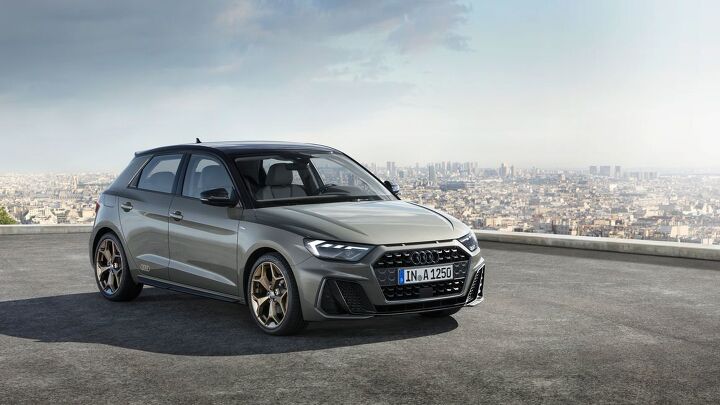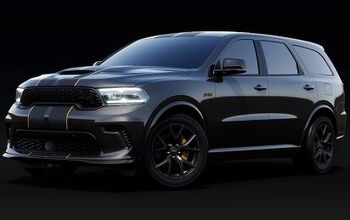Audi Abandoning Subcompact Cars Over Regulatory Pressure

Audi is discontinuing the A1, citing Europe’s regulatory landscape as the main cause. Eager to limit the amount of CO2 coming out of tailpipes, the European Union has placed strict limits on petroleum-powered passenger vehicles. For Audi, the price of manufacturing a subcompact automobile-dependent upon internal combustion is getting too high. Installing a smaller motor would negatively impact drivability while slotting in a hybrid powertrain means more R&D costs and jacking up the MSRP to a point where consumers might lose interest.
There’s just not much incentive to build small, efficient vehicles when the profit margins have been made razor thin and people aren’t buying them in great numbers. And this is a lesson that’s being learned by all automakers, not just those associated to Volkswagen Group.
“We won’t have a successor to the A1,” Audi CEO Markus Duesmann told Automotive News Europe in a recent interview. “We know that offering combustion engines in the smaller segments in the future will be pretty difficult because the costs will go up. Therefore, we will leave the segment.”
Though it’s probably not the only reason. Despite routinely being on the cusp of breaking 100,000 deliveries inside Europe, A1 sales have declined steadily over the last several years. The same is true of sibling subcompacts from Volkswagen Group’s other brands. For example, the VW Polo and SEAT Ibiza have also had good and bad years. But both are coming off a high point as larger sections of the market have been trending toward crossovers and having similar difficulties balancing EU regulations with profitability. Of course, this phenomenon isn’t limited to properties owned by VW.
From AN:
This year the industry must reduce its fleet CO2 average to 95 grams per kilometer [in Europe], down from 106.7 g/km last year, according to JATO Dynamics.
The problem is that automakers struggle to get CO2 levels in their minicars and small cars to below the 95 g/km average without including some form of electrification, which adds cost in segments when margins are thin.
As a result, Opel dropped its Karl and Adam minicars. In addition, Stellantis sister brands Peugeot and Citroen plan to stop making the 108 and C1 minicars, respectively, according to a report.
Daimler, meanwhile, has begun the process of shifting production and development of its Smart brand to China, where the small cars will be built exclusively starting in 2022 as part of a joint venture with Zhejiang Geely Holding.
Mercedes has stated that it’s not going to keep dulling down subcompacts to chase the necessary volumes to make them profitable either. It’ll still produce compact vehicles but anything smaller is likely off the table unless it’s powered by electricity and can be manufactured relatively cheaply. Meanwhile, American automakers have already dipped out of the extra-small segment in their home market. While we cannot blame EU regulations for that, it may have influenced their long-term strategies along with the aforementioned influx of crossover sales.
From our vantage, it looks as though the entire industry is out of whack at this juncture. Balancing safety with efficiency/environmental requirements is already challenging enough. But they’re at odds with consumer trends (which are skewing toward larger automobiles the world over) and economic realities where the buying power of the general public has started to decline. Companies that can’t rely on high volumes are probably wise to stick with models they can charge more for. But we’re also edging out mainstream nameplates that have millions of customers that still need something capable that offers good value for money.
I suppose the preferred government solution is to supplant them all with EVs. But we seem quite a ways off from their reaching functional or financial parity with internal combustion vehicles, especially in smaller packages. It’s a problem in need of a more practical solution than the ones we currently have at our disposal and it’s difficult to see the point of regulating economical vehicles out of existence to adhere to a regulatory environment that was supposed to ensure their proliferation. Worse yet is that the average CO2 emissions (something used as a regulatory benchmark) from passenger vehicles operating in Europe actually started climbing again in 2016 after nearly two decades of consistent declines, according to data from the European Environment Agency. The group also blamed the popularity of sport utility and crossover vehicles, adding that EV adoption had not quite matched the desired targets.
[Image: Audi]

A staunch consumer advocate tracking industry trends and regulation. Before joining TTAC, Matt spent a decade working for marketing and research firms based in NYC. Clients included several of the world’s largest automakers, global tire brands, and aftermarket part suppliers. Dissatisfied with the corporate world and resentful of having to wear suits everyday, he pivoted to writing about cars. Since then, that man has become an ardent supporter of the right-to-repair movement, been interviewed on the auto industry by national radio broadcasts, driven more rental cars than anyone ever should, participated in amateur rallying events, and received the requisite minimum training as sanctioned by the SCCA. Handy with a wrench, Matt grew up surrounded by Detroit auto workers and managed to get a pizza delivery job before he was legally eligible. He later found himself driving box trucks through Manhattan, guaranteeing future sympathy for actual truckers. He continues to conduct research pertaining to the automotive sector as an independent contractor and has since moved back to his native Michigan, closer to where the cars are born. A contrarian, Matt claims to prefer understeer — stating that front and all-wheel drive vehicles cater best to his driving style.
More by Matt Posky
Latest Car Reviews
Read moreLatest Product Reviews
Read moreRecent Comments
- Turbo Is Black Magic My wife had one of these back in 06, did a ton of work to it… supercharger, full exhaust, full suspension.. it was a blast to drive even though it was still hilariously slow. Great for drive in nights, open the hatch fold the seats flat and just relax.Also this thing is a great example of how far we have come in crash safety even since just 2005… go look at these old crash tests now and I cringe at what a modern electric tank would do to this thing.
- MaintenanceCosts Whenever the topic of the xB comes up…Me: "The style is fun. The combination of the box shape and the aggressive detailing is very JDM."Wife: "Those are ghetto."Me: "They're smaller than a Corolla outside and have the space of a RAV4 inside."Wife: "Those are ghetto."Me: "They're kind of fun to drive with a stick."Wife: "Those are ghetto."It's one of a few cars (including its fellow box, the Ford Flex) on which we will just never see eye to eye.
- Oberkanone The alternative is a more expensive SUV. Yes, it will be missed.
- Ajla I did like this one.
- Zerofoo No, I won't miss this Chevrolet Malibu. It's a completely forgettable car. Who in their right mind would choose this over a V8 powered charger at the rental counter? Even the V6 charger is a far better drive.


































Comments
Join the conversation
If the US was any indication, there just wasn't much benefit from A-segment cars. The costs were only incrementally cheaper than B and C segment vehicles, the MPG was typically equal or only slightly better. All the compromises resulted in something great for narrow urban canons and easy to park - but that's about it. I get the Fiat 500, smart4two, Chevy Spark, Scion iQ, etc. had their fans. The biggest problem facing the Spark was the vastly better Sonic sitting right next to it. The Scion iQ was hampered by the Corolla or even the maligned Yaris sitting on the showroom floor. The smart4two was laughable.
Is Audi trying to gaslight everyone? Their arguments sound just like the big three's. -"big gummit" regs will make small cars more expensive, so they will discontinue the small cars, leaving customers no choice but more expensive models. -"big gummit" CO2 regs of 95grams/km are too burdensome for small cars to meet, but not a problem for larger, heavier, inherently less fuel efficient, but more expensive, cars. Their argument is nonsense. They just want to jack up ATP, just like the big three, and they are blaming "big gummit" for their profiteering, just like the big three.